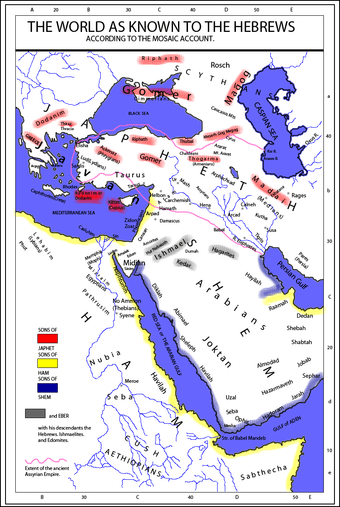Casluhim
The Casluhim or Casluhites (Hebrew: כסלחים) were an ancient Egyptian people mentioned in the Bible and related literature.

Biblical accounts
According to the Book of Genesis (Genesis 10:14) and the Books of Chronicles (1 Chronicles 1:12), the Casluhim were descendants of Mizraim (Egypt) son of Ham, out of whom originated the Philistines.
Archaeology
The Egyptian form of their name is preserved in the inscriptions of the Temple of Kom Ombo as the region name Kasluḥet.[1] In the Aramaic Targums their region is called Pentpolitai understood to be derived from the Greek Pentapolis which locates the area as the north west in what is now the Cyrenaica region of Libya.[2] Another name for their region is Pekosim used in Bereshit Rabbah 37.[2] In Saadia Gaon's Judeo-Arabic translation of the Pentateuch, the Sa'idi people (i.e. the people of Upper Egypt) are listed in the position of the Casluhim in Genesis 10:14,[3] while Albiyim is listed in the position of Pathrusim, however the ordering of Casluhim and Pathrusim sometimes vary in translations [2] and the mainstream understanding is that it is the Pathrusim who are the Sahidic people and the Casluhim the people of eastern Libya.
Ancient literature
Josephus mentions the Casluhim in his Jewish Antiquities I, vi, 2 as one of the Egyptian peoples whose cities were destroyed during the Ethiopic War and who thus disappeared from history. Arab historian Ibn Khaldun (1332–1406), citing Abu Bakr bin Yahya al-Suli, wrote that the Berbers of North Africa were descended from Casluhim, the son of Mizraïm.[4]
See also
References
- Archibald Henry Sayce (2009). The "Higher Criticism" and the Verdict of the Monuments. General Books LLC. p. 91. ISBN 978-1-150-17885-6. Retrieved 28 November 2010.
- Navigating the Bible, World ORT, 2000, commentary Pathrusim, Casluhim
- Saadia Gaon (1984). Yosef Qafih (ed.). Rabbi Saadia Gaon's Commentaries on the Pentateuch (in Hebrew) (4 ed.). Jerusalem: Mossad Harav Kook. p. 33 (note 37). OCLC 232667032.
- Ibn Khaldun (1925). Histoire des Berbères et des dynasties musulmanes de l'Afrique septentrionale (in French). 1. Translated by Baron de Slane. Paris: P. Geuthner. p. 176. OCLC 556514510.